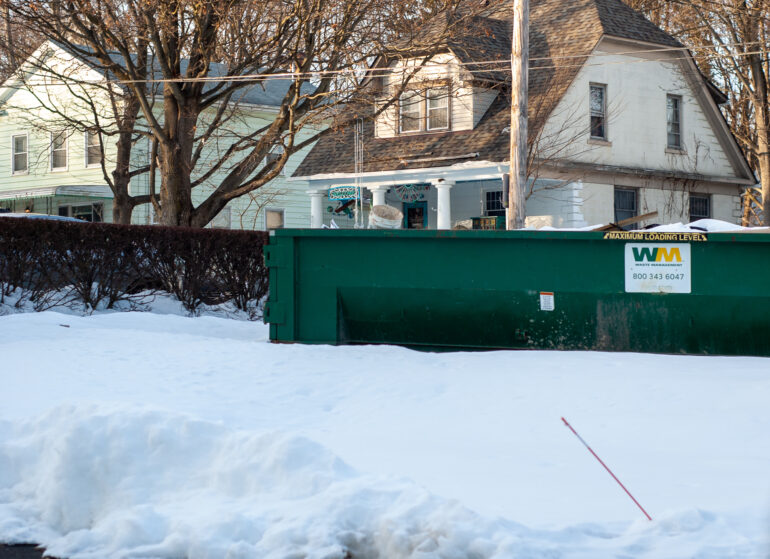When Triangle Dry Cleaners shut down in 2005, it left behind harmful chemicals that have the potential to harm Kent residents and render the property useless for redevelopment.
Kent City Council recently approved an application to the Ohio Department of Development for a $300,000 grant to clean up the Triangle Cleaners site before chemicals start leaking into the groundwater. To avoid these problems, Community Development Director Bridget Susel applied for the money to fix it now, rather than deal with it later. There’s no word yet if the city will win the money, but if they do, it would prevent a much bigger problem.
The cleaners, located near the Sheetz by the corner of Rockwell Street and North Mantua Street, is just another brownfield for the city to deal with, and one of a handful across the county.
Brownfields are former industrial or commercial properties that have become contaminated with some kind of pollution, said Robert Simons, an urban planning professor at Cleveland State. They can’t be redeveloped or repurposed until they are cleaned up.
These polluted areas not only tank the value of the land they pollute, but also the properties around them. Simons said properties in the area of a current or former groundwater polluter, for example, can suffer property value reductions in the range of 10-20%.
But the economical blight is only a part of the problem. According to the EPA, industrial or commercial activity like emissions, soil or groundwater contamination, surface runoff or waste dumping can exacerbate biological, physical or chemical dangers from nearby brownfields.
If the chemicals from Triangle Cleaners migrate from the original site, it could expose nearby residential neighborhoods to carcinogenic chemicals if it contaminated soil in their yards or under their foundation.
Susel said the site has a history dating back to 1893. It was a gas and oil service station and a car battery service before it was a dry cleaner from 1984 to 2005. In this case, Triangle Cleaners’ pollution comes from chlorinated solvents dissolved in the soil and bedrock from improper storage and disposal.
“The city had been doing acquisition of properties in the West River neighborhood in order to facilitate new development along that commercial corridor,” said Susel, who has been managing the problem since the city overtook the land. “When the dry cleaner closed, that property was acquired and the dry cleaning building was demolished in about 2006, and several feet of topsoil were removed and replaced with new soil.”
Susel said the original owners are long gone, and since there was no private party to blame or fine for the pollution, Kent had to undertake the cleanup on its own dime. The city installed monitoring wells in subsequent years to keep track of “legacy issues,” which are often a problem with former dry cleaners.
“What we’re wanting to do is to get in there and remove any soils that may have that and then also do a carbon injection into areas around there where that chemical could potentially leak into crevices in the bedrock under the ground,” Susel said. “Basically stopping it where it’s at.”
While that leakage hasn’t happened yet, Susel explained that if left unaddressed, those solvents could wreak havoc to surrounding areas in five to 15 years.
The harmful chemicals that come from dry cleaners like chloroform, perchloroethylene and formaldehyde pollute every part of the environment if cleaners don’t operate within state and federal regulations, according to the EPA. The Certified Commercial Investment Member Institute, which studies factors that can impact property values, estimates that “more than 70 percent of past and present dry cleaners accidentally or intentionally released chemicals into the soil or groundwater, and the cleanup costs range from tens of thousands of dollars to several million dollars.”
Triangle Cleaners isn’t the only dry cleaner in the area that’s become a brownfield. The Copley Square Plaza, in Summit County, hosted dry cleaning businesses under different owners between the 1960s and the early 1990s. Those businesses dumped their chemicals into concrete holding tanks, which eventually cracked open and leaked their contents into the groundwater.
“There were some complaints of water odor issued to both the county health department and then eventually the state of Ohio,” said EPA Superfund Project Manager Margaret Gielniewski. “Those complaints made their way to the EPA, so there was an investigation.”
EPA installed monitoring wells in the same way Kent did with Triangle Cleaners, and then started the process of cleaning it all up.
The pollution had already migrated to the private wells of nine homes in the community, so the EPA had to come in and install filters in the wells before moving all the homes to city water.
Dry cleaners now are subject to more stringent guidelines for waste disposal than in the days of Copley Square Plaza. The EPA said in a report that dry cleaners can use distilling machines to recycle and reuse old cleaning chemicals. Cleaners can also pay third-party companies to dispose of whatever leftover waste they have after distilling.
Cleaning up brownfields like Copley and Triangle Cleaners to create an opportunity for redevelopment is the goal for this new round of funding from the state Department of Development. The previous state effort to help address brownfields, the Clean Ohio Revitalization Fund, ran out of money in 2012. Since then, Greater Ohio Policy Center advocated for additional support, and got it. In 2021, Ohio announced new funding for its brownfield remediation program. GOPC’s focus now is to help get funds to communities like Kent.
“We’re tackling the brownfields that can be cleaned up for safety and economic development and push for whatever that productive use would be for each community,” said Senior Manager of Outreach and Projects Aaron Clapper.
Wyatt Loy is a reporter with the Collaborative News Lab @ Kent State University, producing local news coverage in partnership with The Portager.

